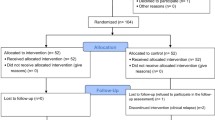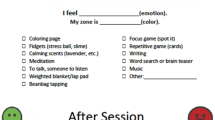Abstract
Social behavioral disorders and impaired self-awareness, which are sequelae of brain injuries, have negative effects on interpersonal relationships and employment. In this study, we performed a long-term client-centered approach to help the patient diagnosed with a social behavior disorder and impaired self-awareness return to work. Cognitive rehabilitation, cognitive-behavioral treatment, and positive behavioral support were provided while assessing the self-awareness using the Japanese version of the Self-Regulation Skills Interview. This patient exemplifies the importance of establishing methods for self-monitoring and rebuilding a positive self-identity while considering the complexities of self-awareness when helping patients with impaired self-awareness. The patient took the initiative in managing problematic behaviors due to social behavior disorder, and as a result, was able to achieve stable self-awareness. The strategies described in this patient can be used in the future to treat patients with social behavior disorder due to inadequate self-awareness. In order to practice a client-centered approach while assessing the patient's level of self-awareness, it is important to build a trusting relationship over a long period. To assess the level of self-awareness, existing interviews, questionnaires, and work to express one's mental and physical state as seen by the patient may be effective.

Similar content being viewed by others
Data Availability
The data that support the findings of this study are available from the corresponding author upon reasonable request.
Code Availability
Not applicable.
References
Amanzio, M., Bartoli, M., Cipriani, G. E., & Palermo, S. (2020). Executive dysfunction and reduced self-awareness in patients with neurological disorders: A mini-review. Frontiers in Psychology, 11, 1697. https://doi.org/10.3389/fpsyg.2020.01697
Amanzio, M., Palermo, S., Zucca, M., Rosato, R., Rubino, E., Leotta, D., Bartoli, M., & Rainero, I. (2018). Neuropsychological correlates of instrumental activities of daily living in neurocognitive disorders: A possible role for executive dysfunction and mood changes. International Psychogeriatrics, 30(12), 1871–1881. https://doi.org/10.1017/S1041610218000455
Bach, L. J. (2014). Long term rehabilitation management and outcome of anti-NMDA receptor encephalitis: Case reports. NeuroRehabilitation, 35(4), 863–875. https://doi.org/10.3233/NRE-141176
Brown, L., Fish, J., Mograbi, D. C., Bellesi, G., Ashkan, K., & Morris, R. (2021). Awareness of deficit following traumatic brain injury: A systematic review of current methods of assessment. Neuropsychological Rehabilitation, 31(1), 154–188. https://doi.org/10.1080/09602011.2019.1680393
Cook, J. A., Copeland, M. E., Corey, L., Buffington, E., Jonikas, J. A., Curtis, L. C., Grey, D. D., & Nichols, W. H. (2010). Developing the evidence base for peer-led services: Changes among participants following Wellness Recovery Action Planning (WRAP) education in two statewide initiatives. Psychiatric Rehabilitation Journal, 34(2), 113–120. https://doi.org/10.2975/34.2.2010.113.120
Copeland, M. E. (2002). Wellness recovery action plan. National Health Service. Retrieved October 29, 2021, from https://combined.nhs.uk/download/83/person-centredness-framework/3759/wrapworkbook-adults.pdf
Crosson, B., Barco, P. P., Velozo, C. A., Bolesta, M. M., Cooper, P. V., Werts, D., & Brobeck, T. C. (1989). Awareness and compensation in postacute head injury rehabilitation. Journal of Head Trauma Rehabilitation, 4(3), 46–54. https://doi.org/10.1097/00001199-198909000-00008
Cullen, B., Pownall, J., Cummings, J., Baylan, S., Broomfield, N., Haig, C., Kersel, D., Murray, H., & Evans, J. J. (2018). Positive PsychoTherapy in ABI Rehab (PoPsTAR): A pilot randomised controlled trial. Neuropsychological Rehabilitation, 28(1), 17–33.
Doig, E., Kuipers, P., Prescott, S., Cornwell, P., & Fleming, J. (2014). Development of self-awareness after severe traumatic brain injury through participation in occupation-based rehabilitation: Mixed-methods analysis of a case series. American Journal of Occupational Therapy, 68(5), 578–588. https://doi.org/10.5014/ajot.2014.010785
Ganau, M., Lavinio, A., & Prisco, L. (2018). Delirium and agitation in traumatic brain injury patients: An update on pathological hypotheses and treatment options. Minerva Anestesiologica, 84(5), 632–640. https://doi.org/10.23736/S0375-9393.18.12294-2
Hart, T., Vaccaro, M. J., Fann, J. R., Maiuro, R. D., Neuberger, S., & Sinfield, S. (2020). Psychoeducational interventions for problematic anger in chronic moderate to severe traumatic brain injury: A study of treatment enactment. Journal of the International Neuropsychological Society: JINS, 26(1), 119–129. https://doi.org/10.1017/S1355617719000833
Jack, C. (2020). Positive behavior support-based in-home services for traumatic brain injury. Walden Dissertations and Doctoral Studies, 8463, 1–102.
Judd, D., & Wilson, S. L. (2005). Psychotherapy with brain injury survivors: An investigation of the challenges encountered by clinicians and their modifications to therapeutic practice. Brain Injury, 19(6), 437–449. https://doi.org/10.1080/02699050400010994
Langer, K. G., & Padrone, F. J. (1992). Psychotherapeutic treatment of awareness in acute rehabilitation of traumatic brain injury. Neuropsychological Rehabilitation, 2(1), 59–70. https://doi.org/10.1080/09602019208401395
Little, A., Byrne, C., & Coetzer, R. (2021). The effectiveness of cognitive behaviour therapy for reducing anxiety symptoms following traumatic brain injury: A meta-analysis and systematic review. NeuroRehabilitation, 48(1), 67–82. https://doi.org/10.3233/NRE-201544
Minami, S. (2019). 統合失調症の急性期作業療法において意味のある作業に着目することの有用性The usefulness of attending to meaningful occupations in the acute phase of occupational therapy for patients of schizophrenia. Occupational Therapy, 38(1), 103–109. https://doi.org/10.32178/jotr.38.1_103
Miyahara, T., Shimizu, H., Hanaoka, H., Yamane, S., Kawahara, K., & Moriyama, K. (2012). 脳損傷者に対するself-awareness (自己の気づき) の評価法「日本語版SRSI (Self-Regulation Skills Interview: 自己統制能力質問紙) 」の作成および信頼性・妥当性の検討 [Development of Self-Regulation Skills Interview in Japan: reliability and validity]. Development of Self-Regulation Rihabiriteshon, 40, 1117–1126. https://doi.org/10.11477/mf.1552102632
Monnet, F. P. (2003). Behavioural disturbances following Japanese B encephalitis. European Psychiatry, 18(6), 269–273. https://doi.org/10.1016/j.eurpsy.2003.09.001
O’Callaghan, C., Powell, T., & Oyebode, J. (2006). An exploration of the experience of gaining awareness of deficit in people who have suffered a traumatic brain injury. Neuropsychological Rehabilitation, 16(5), 579–593. https://doi.org/10.1080/09602010500368834
O’Keeffe, F. M., Murray, B., Coen, R. F., Dockree, P. M., Bellgrove, M. A., Garavan, H., Lynch, T., & Robertson, I. H. (2007). Loss of insight in frontotemporal dementia, corticobasal degeneration and progressive supranuclear palsy. Brain, 130(3), 753–764. https://doi.org/10.1093/brain/awl367
Orfei, M. D., Varsi, A. E., Blundo, C., Celia, E., Casini, A. R., Caltagirone, C., & Spalletta, G. (2010). Anosognosia in mild cognitive impairment and mild Alzheimer’s disease: Frequency and neuropsychological correlates. American Journal of Geriatric Psychiatry, 18(12), 1133–1140.
Ownsworth, T. (2017). Managing self-awareness and identity issues following brain injury. In B. A. Wilson, J. Winegardner, C. M. van Heugten, & T. Ownsworth (Eds.), Neuropsychological rehabilitation: The international handbook (pp. 340–353). Psychology Press.
Ownsworth, T. L., McFarland, K. M., & Young, R. M. (2000). Development and standardization of the Self-regulation Skills Interview (SRSI): A new clinical assessment tool for acquired brain injury. Clinical Neuropsychologist, 14(1), 76–92. https://doi.org/10.1076/1385-4046(200002)14:1;1-8;FT076
Prigatano, G. P., Ogano, M., & Amakusa, B. (1997). A cross-cultural study on impaired self-awareness in Japanese patients with brain dysfunction. Neuropsychiatry, Neuropsychology, and Behavioral Neurology, 10(2), 135–143.
Robertson, J. (2010). Psychological needs following stroke - NHSGGC1. Retrieved October 29, 2002, from http://library.nhsggc.org.uk/mediaAssets/CHP%20Inverclyde/Psychological_Needs_following_Stroke_Inverclyde_Protected_Learning_Event_10th_March_2010.pdf
Schmidt, J., Lannin, N., Fleming, J., & Ownsworth, T. (2011). Feedback interventions for impaired self-awareness following brain injury: A systematic review. Journal of Rehabilitation Medicine, 43(8), 673–680. https://doi.org/10.2340/16501977-0846
Tate, R., Kennedy, M., Ponsford, J., Douglas, J., Velikonja, D., Bayley, M., & Stergiou-Kita, M. (2014). INCOG recommendations for management of cognition following traumatic brain injury, part III: Executive function and self-awareness. Journal of Head Trauma Rehabilitation, 29(4), 338–352.
Toglia, J., & Kirk, U. (2000). Understanding awareness deficits following brain injury. NeuroRehabilitation, 15(1), 57–70.
Wehman, P., Targett, P., West, M., & Kregel, J. (2005). Productive work and employment for persons with traumatic brain injury: What have we learned after 20 years? Journal of Head Trauma Rehabilitation, 20(2), 115–127. https://doi.org/10.1097/00001199-200503000-00001
Ylvisaker, M., Turkstra, L. S., & Coelho, C. (2005). Behavioral and social interventions for individuals with traumatic brain injury: A summary of the research with clinical implications. Seminars in Speech and Language, 26(4), 256–267. https://doi.org/10.1055/s-2005-922104
Acknowledgements
We would like to thank the patient and his family who participated in this study. We would also like to thank his employer at his company for sharing information with us.
Funding
No funding was received to assist with the preparation of this manuscript.
Author information
Authors and Affiliations
Contributions
KK wrote the first draft of the paper, which was reviewed by each author, all of whom contributed to the clinical care of the patient; authors’ textual changes and additions were all incorporated. YN contributed to the assessment and interpretation of the SRSI. TM addressed the patient's treatment options and offered suggestions.
Corresponding author
Ethics declarations
Conflict of interest
The authors have no relevant financial or non-financial interests to disclose.
Ethical Standards
With regard to this report, the handling of personal information was thoroughly explained, and written informed consent was obtained from the patient for publication of this report and any accompanying images. Our institution’s ethics committee has instructed that the report need not be ethically reviewed, provided the patient is consented to and anonymized.
Consent to Publish
The patient has consented to the submission of the patient report to the journal.
Additional information
Publisher's Note
Springer Nature remains neutral with regard to jurisdictional claims in published maps and institutional affiliations.
Rights and permissions
About this article
Cite this article
Kawabata, K., Nakajima, Y., Makino, T. et al. Support for Returning to Work for a Patient of Social Behavior Disorder with Impaired Self-awareness. J Contemp Psychother 52, 165–171 (2022). https://doi.org/10.1007/s10879-021-09529-0
Accepted:
Published:
Issue Date:
DOI: https://doi.org/10.1007/s10879-021-09529-0




